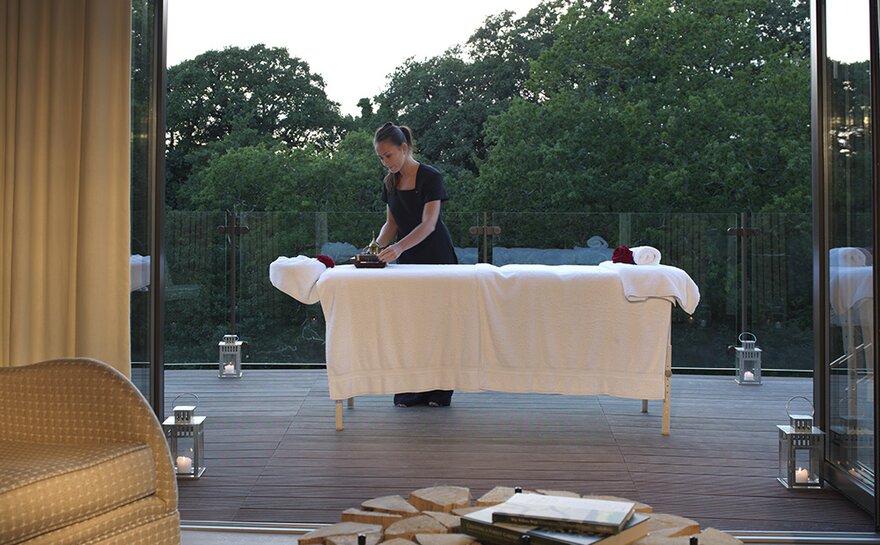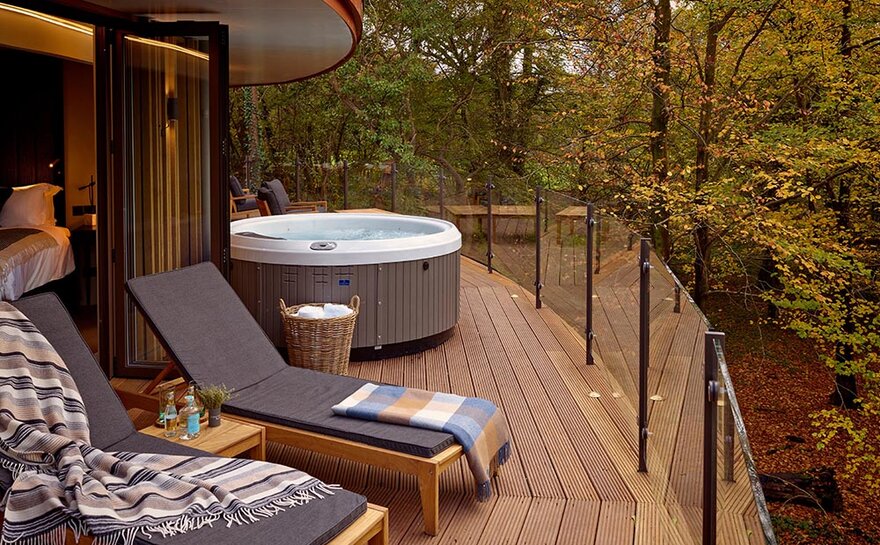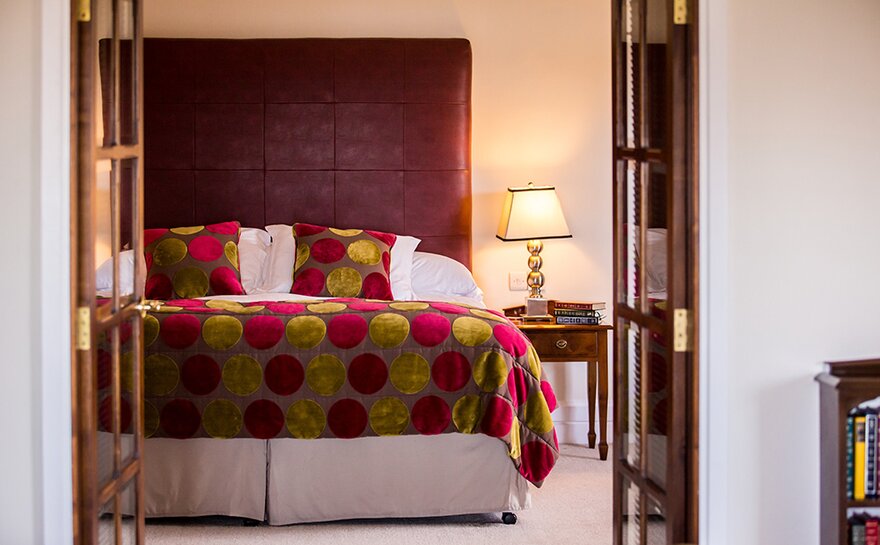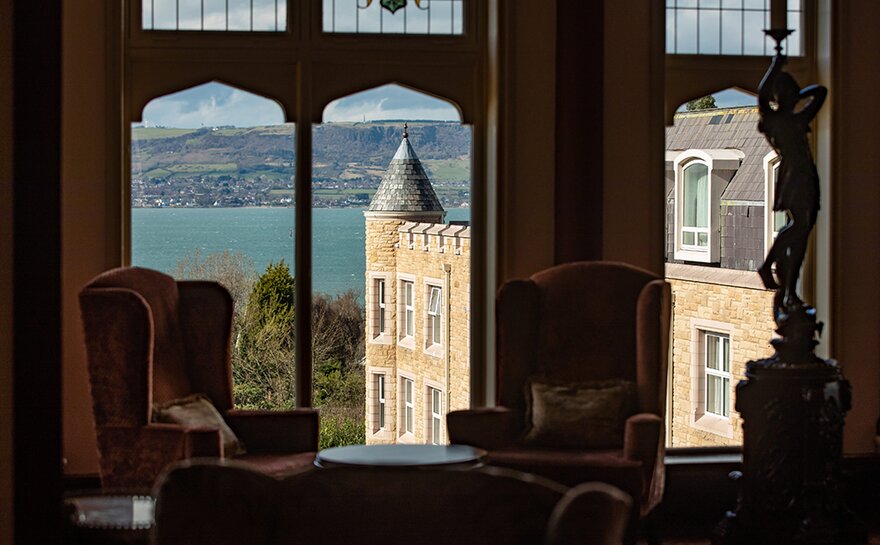Sleep tourism is on the rise, with hotels offering everything from sleepy spa treatments and slumber-inducing menus, to mattresses that analyse guests' kip
Sleep tourism might seem like a redundant term – don't we all sleep when we stay in a hotel?
Not according to the Sleep Foundation, whose recent survey found we tend to get less sleep in a hotel than at home; asked where they felt they slept better, 64.9% of respondents chose home, while only 13% chose hotels.
Driven by an ever-growing focus on wellness, hotels are upping their sleep game, offering spa therapies, CBD remedies, meditation techniques and various in-room amenities that put a decent night's shuteye at the forefront.
That's being driven by consumers; a 2024 Luxe Report by global travel network Virtuoso found 34% of its advisors had witnessed an increase in demand for sleep programmes.
And it's been further propelled by the pandemic, according to Stella Photi, founder and managing director of travel company Wellbeing Escapes: "Post-pandemic, we've noticed more people are interested in preventative health," she says. "Sleep disorders have been affecting a larger proportion of the population, largely caused by increased levels of stress, anxiety, digestive issues and bad sleep hygiene.
"With sleep now recognised as being an integral pillar for health, many resorts are designing programmes and addressing their product to aid guests in getting a good night's sleep," she says. "These dedicated wellness retreats are introducing specific programmes that help educate guests on good sleep hygiene, but also get to the root cause of what's causing the issue in the first place."
Sleep-inducing spa therapies
So, what are hotels doing to attract guests looking for a good night's rest? "We're seeing things like meditation lessons, breathing techniques and treatments to balance the nervous system," says Photi. "Hotels are also often priding themselves on the quality andcomfort of their mattresses. Some brands such as Six Senses Hotels Resorts Spas are using biohacking technology to set up sleep trackers for their guests, and herbal sleep tisanes are also becoming more popular – as is the encouragement of exercise in nature to realign circadian rhythms."
Several hotels are partnering with experts and offering one-on-one consultations. Earlier this year, Preferred Hotels & Resorts member the Londoner launched a limited-time sleep package in partnership with nutritional therapist and certified medical practitioner Elena Rolt. Guests were offered a 20-minute consultation with Rolt as well as a specially curated food menu to encourage a good night's sleep.
Many hotels are offering spa treatments using CBD and other ingredients to help clients dose off. Lucknam Park Hotel & Spa in Wiltshire, for example, offers a Kloris Sleep Soundly Ritual that uses "organically grown CBD balm", aromatherapy oils and warm poultice to encourage a restful snooze. Guests also get a ‘sleeping patch' to prolong the effects of the treatment, and can opt for a floating meditation combining CBD balm with a vibrating Sensate device for the ultimate nerve-calming therapy.
Spa and wellness director Jessica Grant Sloyan says the team developed the sleep-focused ritual after noticing interest in more results-focused treatments. "The demand for wellness treatments is certainly increasing, and as people are travelling more again, our sleep-focused therapies have been very well received," she says. "Sleep is needed to repair, regenerate and support our brain function and immune system, and consumers are becoming more aware of this. In my opinion, focus on sleep is not just a trend, but a key shift."
Lucknam Park is not the only spa hotel incorporating CBD into its treatments. Chewton Glen recently introduced a new Sleep Soundly therapy in partnership with CBD wellness brand OTO. The hour-long massage combines CBD with Himalayan salt stones to "rapidly reduce inflammation and harness the parasympathetic nervous system", with accompanying sounds to identify imbalances in the body, encourage a full circadian rhythm and promote restorative sleep. Guests can also choose to add on an OTO ‘Sleep Selection' kit, featuring sleep-inducing products from the brand.
Elsewhere, other sleep-promoting ingredients and techniques are being incorporated into spa treatments. Carbis Bay Hotel & Estate in Saint Ives, for example, offers a Bamford B Silent Ritual that combines a foot bath with shiatsu rocking techniques, massage and stretches to release stress and tension in preparation for a restful sleep. In Durham, Seaham Hall offers a Five Senses Sound Ritual alongside a special suite by sound therapy experts Swell, featuring a curated, sleep-inducing meditative playlist.
Rosewood London, meanwhile, offers a Votary Antidote Sleep Journey targeted at those struggling with "insomnia, adrenal fatigue, jet lag and high levels of stress", combining plant oils with shiatsu, breathing exercises, sound therapy and a massage to balance the chakras, and follows the group's Alchemy of Sleep retreats, launched in 2022.
Sleep hygiene in hotels
Sleep tourism isn't just about the spa treatments and yoga classes, though – hotels are putting a growing emphasis on sleep hygiene, from pillow menus and extra-soft linen to air-purifying filters and special mattresses.
Take Zedwell Hotels, whose three London properties have a good slumber as their raison d'être. Designed in collaboration with a team of psychologists, scientists and sleep experts, their clutter-free ‘cocoon' rooms boast noise-reducing walls, air-purifying filters, Egyptian cotton sheets and Hypnos mattresses – plus a deliberate lack of complicated switches, electronics and TVs. Guests can also expect calming playlists, sleep-inducing fragrances and nutritional menus, all designed to induce a good snooze.
Over in Belfast, Hastings Hotels has partnered with various sleep-centric brands to create a ‘Perfect Night's Sleep Package' at Culloden Estate & Spa and Grand Central Hotel Belfast. Guests who opt for the package can expect 300-thread count Irish linen, hypoallergenic wool pillows designed for "optimal neck support and thermal regulation", and a sleep-inducing, essential oil pillow spray. The hotels' ‘cloud beds' have been designed to promote sound sleep, featuring 1,600 pocket springs that mould to the guest's body shape.
Sea Containers London has taken it up another gear with its special Ship Shape Suite. The suite features a water thermo-regulated and digitalised mattress designed by sleep experts Eight Sleeps, which tracks sleep stages throughout the night. Guests get a full sleep report when they wake up, showing everything from respiratory rate to resting heart rate. They can also control the temperature of the bed with their smartphone to set their ideal, sleep-inducing conditions.
Quiet locations for peaceful sleep
Beyond extra-comfy bedding and futuristic, sleep-sensing tech, hotels are putting the emphasis on location too, promoting peaceful, remote stays that allow guests to properly switch off.
The Pig opened its South Downs outpost in 2021, offering a quiet retreat in the middle of an International Dark Sky Reserve, with minimal light and sound pollution providing the perfect backdrop for a good night's rest. Properties like the Tawny in Staffordshire and the Kylesku hotel, deep in the Scottish Highlands, meanwhile pride themselves on offering secluded retreats away from the hustle and bustle, where guests can disconnect and sleep without distractions.
Demand for secluded, rural cabin stays and glamping-style trips is also booming; the global glamping market size reached $2.4b (£1.9b) in 2021 and is expected to grow at a compound annual growth rate of 10.10% until 2030, according to Grand View Research.
Canopy and Stars, the UK's leading glamping company, has seen revenue grow 180% since 2017, doubling from 2019 to 2022. The company says demand for its cabins and treehouses in particular has increased as guests seek to disconnect in nature.
Digital detox cabin company Unplugged is taking it up another level, offering three-day programmes where guests lock their phones away to "refocus and recharge". Co-founder Hector Hughes says guests notice how switching off their phones benefits their sleep. "Social media or your inbox stimulates your brain when it should be winding down," he says. "We include lockboxes in our cabins for guests to lock away their devices, which means guests don't scroll before they go to sleep. No phones means no external source tampering with your natural circadian rhythms."
Hughes says occupancy was at 97% in the second half of 2023, with some cabins fully booked through to summer – demonstrating rising demand for off-grid, secluded stays that put peace and quiet at the forefront. As with dedicated sleep retreats, these remote cabins are relegating decadent dining, late-night entertainment and too many drinks at the bar in favour of a good night's kip, and there's a clear market for it.
How others in the industry adapt to the growing trend remains to be seen, but it's clear that sleep hygiene and rest-inducing environments are growing from a nice-to-have side-note to the core motivation for many guests' bookings.
Prioritising health
Karen Joyce, general manager UK & Ireland, Virtuoso, says: "In recent years, we've seen the hospitality industry respond to a growing demand for enhanced sleep experiences driven by wellness trends, stressful lifestyles, scientific awareness and a desire for competitive advantage. To cater to this growing demand, many of our partners are incorporating features such as specialised amenities, wellness packages and in-room enhancements to attract guests seeking a rejuvenating stay. This trend reflects a broader cultural shift towards prioritising health and wellbeing, making sleep-centric experiences a key focus for the hospitality industry.
"Many Virtuoso hotels and resorts are enriching the guest experience through spa treatments, sleep retreats and personalised in-room features. We're seeing an increasing number of hotels offer customisable pillow menus, extra-soft linens and innovative amenities such as smart lighting systems. Wellness products like CBD drops and aromatherapy kits are also being introduced, reflecting a broader trend in providing guests with immersive and rejuvenating stays that prioritise both comfort and holistic wellbeing.
"During the pandemic, we saw a rise in ‘coronasomnia' – as a result, an increasing amount of research was conducted pointing towards the importance of sleep for both our mental and physical health. Given stress levels are not decreasing, there is a drive among these hotels to not only improve sleep conditions during the stay, but to offer programmes rooted in long-term benefits that set the course for more productive sleep once guests return home."
Sleep programmes
In Chelsea, Belmond's the Cadogan has introduced a sleep concierge created in partnership with Harley Street clinical hypnotherapist and sleep expert Malminder Gill. Guests receive a sleep-inducing meditation recording by Gill, a pillow menu with different options for back and side-sleepers, scented pillow mist and a special bedtime tea. Theycan also choose to book an in-room, one-to-one appointment with Gill to get more personalised recommendations.
Notting Hill-based boutique hotel the Laslett offers its own equivalent under its West London Sleep Sanctuary Package. The package combines sleep-inducing products by skincare brand Votary with in-room books, an extra-soft silk sleep mask, late check-out and a tin of DIRTEA Cacao – a mushroom-based drink that contains sleep-promoting ingredients.
At Rocco Forte's Brown's Hotel in Mayfair, a ‘Forte Winks' programme provides a silk ‘sleepover kit', night cream and a night-time herbal tea, plus breakfast and a facial at the spa the following morning.
The Langham London offers a ‘Sleep Matters by Chuan' programme, created in collaboration with the experts at the World Sleep Society. Guests get various in-room wellness amenities, from a lavender-scented spray to ear plugs and a special eye mask. They also have access to a series of breathing exercises designed by the Chuan Spa's Chinese medicine doctor, plus a ‘Sleep Matters' card providing tips from the World Sleep Society on how to get a better night's rest.
Continue reading
You need to be a premium member to view this. Subscribe from just 99p per week.
Already subscribed? Log In













